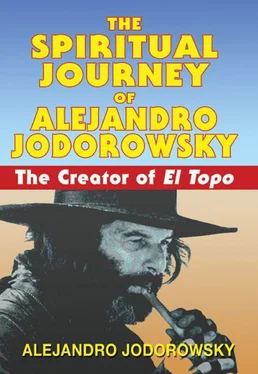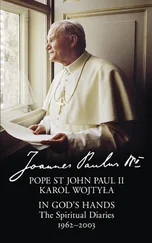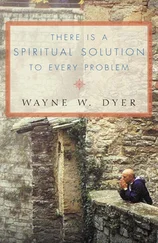This elicited enthusiastic applause. Inspired by this appreciative audience, I began to invent koans and offer solutions.
“Why do mountains have rocks?. . Mountains don’t have rocks. The rocks are the mountain. . Why is the mouth under the eyes?. . Because the mouth is for kissing the earth and the eyes are for kissing the sky. . Why can’t I stop thinking?. . I don’t think — the thoughts think me.”
Carried away by their enthusiasm, I even stepped down from the stage and began to mingle with the audience. Suddenly, I saw that their eyes were no longer on me but were fixed on the stage, which was at my back. Something was happening there.
When I turned around and looked, I felt as if I was in a dream. Ejo Takata, dressed in a monk’s robe was seated in meditation position, grinning at me.
It had been ten years since I’d seen him, but he looked the same as ever — generous spirit, ageless face, anchored to the ground, head pushing at the sky!
He jumped right into our game, holding his wooden kyosaku in a threatening gesture. (On one side of this stick the characters say: “I can teach you nothing. Teach yourself.” On the other side is written: “The plant flowers in the spring.”)
“What is the sound of an empty mind?” he asked me.
“The same sound as the voice that asks,” I answered without hesitation.
Ejo shouted a joyous “Kwatzu!. . Where does a thought spring from, and what is it?”
“Ideas have no owners. They are in the world, seeds of action.”
He began fanning himself. I realized I had fallen into the old intellectual trap. I prostrated myself three times before the master (sensei), and I recited one of his own proverbs: “A boat can find support on the water. The water can overturn the boat.” And I awaited the next question.
“When the mind is empty, what does it see?”
“Everything but itself.”
“Kwatzu! When a thought springs forth, where does it come from?”
“Tell me where it is going, and I’ll tell you where it comes from.”
“Kwatzu! If you see that a thought is excessive and artificial, do you think that there also exists a natural thought?”
“The farmer waits for rain; the traveler waits for good weather.”
“Kwatzu! What does your birthday mean to you?”
“There is no birth or death.”
He made a sign for me to come on stage. I climbed up and kneeled before him and touched the floor three times with my head.
He lifted me up with a smile. Holding the kyosaku in a horizontal position, he offered it to me. My hands were burning and my feet were freezing. Never had I expected to receive such an honor. Without thinking about what I was doing, I took the stick as in a dream and held it against my breast.
The students began to applaud. I had to acknowledge this with a bow, but as I was doing so, Ejo took advantage of the moment to disappear. After a minute of confusion, I ran outside to try to find him.
By chance, several cars were waiting in line to leave the parking lot. I saw Ejo in one of them, a beat-up old car with an Indian-looking driver. When he saw me, he rolled down the window. I held out the kyosaku to him, crying, “I don’t deserve this! You yourself once told me: ‘If you have the stick, I will give it to you. If you don’t have it, I’ll take it away from you.’ You must give your stick to someone who already has it. And I do not have it! I demand you take it!”
Ejo lowered the window farther. Instead of taking the kyosaku, he threw his fan in my face and rolled up the window again. The car started moving. I ran after it as fast as I could, but I could not catch up. Breathless, I stood there and began to fan myself. On the paper of the fan was written: “Chapultepec Forest. The usual place, same time, tomorrow.”
I couldn’t believe my eyes. Deep down, I had always aspired to become a master basking in the veneration of hundreds of disciples. Not only that, but I wanted to be able to sit cross-legged for endless hours in a zendo, a smiling Buddha until I died. I also knew this was an unattainable goal. I knew only too well my shameful weakness, my flawed successes, my ignorance like that of a microbe in the infinite cosmos.
To lose Ejo as a master was unbearable. “A master is for your entire life.” By giving me his stick and his fan, he made me not only his peer but also his successor. He must be saying that he was leaving, that he was sick, or that he thought he was about to die. I felt nauseous at this thought. I was losing my support. The axis around which I turned, thinking it always protected me, was about to be taken away. I had countless questions and no real answers. Ejo was the only one who could provide the one answer to all my questions. A cloud veiled my vision. If Ejo perceived in me the value of a master, he was mistaken, and if he could make such a mistake, then he was not a true master. I felt like vomiting. I collapsed, sitting upon a cement bench. I fanned myself with his fan. With the stick I gave myself several blows on my shoulder blades.
“Master. .”
An exceedingly skinny youth with brilliant eyes came up to me. Feeling ridiculous, I immediately stopped striking and fanning myself. I forced myself to smile at him. He kneeled before me.
“Please allow me to introduce myself. My name is Daniel. I just came from your lecture. I saw your film The Holy Mountain . It changed my life. I have made a short film, inspired by your work. I wanted to thank you. .”
His admiration came at a most inopportune moment, but I replied, simulating a warm friendliness: “Stand up and come sit down beside me. Thank you for your thanks. Would you like an autograph?”
“Well, of course, that would give me pleasure, Master. But if you don’t mind, I would like to ask a favor of you. .”
“Ask whatever you like, but don’t call me ‘Master.’”
“Actually, I’m a writer as well as a filmmaker. I’ve been reading ever since I could think. Yet I know nothing about Zen. I’ve never heard of these strange koans before. When you asked them, I had no idea how to answer, and afterward I didn’t understand your answers. Nor did I understand the ones you gave to the monk. Could you explain the meaning of all this to me?”
I had to get a grip on myself in order not to burst into tears. The absurd dance of fate had sent me a boy who took me for a master, whereas my mind was like a mirror broken into a thousand pieces. His desire to understand was so naive and his trust in my artistic mastery was so great that I felt incapable of disappointing him. Mustering a tone of calm and assurance, I improvised a little speech for him.
“Mountains do not have rocks any more than the world has individuals. The rocks are the mountain; the individuals are the world. The totality of the universe is one. The mouth is below the eyes; the birds fly in the sky; the fish swim in the sea. Everything has its natural place, without effort, in happiness. The bird drowns in the water just as the fish drowns in the air. Happiness means being ourselves in the place that is right for us. We think but we are not our thoughts. When we identify ourselves with our thoughts, we cease to be ourselves. Thoughts are, but we are not. The sound of an empty mind is the noise of the words of the one who is asking questions. ‘From where does a thought spring and what is it?’ That question is a bunch of words that cannot be answered properly by another bunch of words. One thought springs from another thought, and so on to infinity. Yet saying ‘bread’ does not satisfy our hunger. I should have just screamed at every question and given that as an answer. When the mind is empty, the observer-actor dualism disappears. If we see ourselves, we are not empty — no one arriving, no one leaving, everything just always here. Every thought is a mirage. There is no first cause; it is neither the chicken nor the egg. No beginning, no end. Permanent impermanence, formless present. Accept this appearance of change!”
Читать дальше












